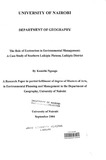| dc.description.abstract | Eco-tourism is a more synergetic approach to tourism that tends to bind the tourist,
local community and the environment. Tourists are people travelling and staying at
a place for 24 hours or more and for various reasons and purposes. Tourists could
either be Local or International.
The study aims at assessing the actual role of eco-tourism in the environmental
conservation in the southern Laikipia plateau and more specifically in Laikipia
District, which covers about 9000 square kilometres and lies between latitudes 0°
18' south and 0° 51' north and longitudes 36° 11' and 37° 24' east. The fragile
ecosystem of Laikipia district could benefit from eco-tourism due to its holistic
nature. Though many researches have been carried out on the subject of tourism,
none has narrowed to eco-tourism and more so on its effects on environmental
management in this area.
This study could open up the prospects of wildlife farming as a business and
development of community owned tourism facilities by teaming up of small
holders, ranchers and investors. This could add up and improve on the current
agricultural and pastoral livelihoods. The major objective of the study is to restate
the extent of eco-tourism and its earnings in relation to agricultural earnings,
analyze the human wildlife conflict, including charcoal burning and other inter-industry
linkages.
The study has made assumptions to the effect that human-wildlife conflict would
be reduced if land is set aside for wildlife and same used for tourism; that with the
setting aside of such land and opening up of the wildlife corridors, the abundance
of wildlife would be realized and investors would be willing to invest in eco-Iodges and other such facilities, and with proper planning the hostile climate would be
turned into assets in promotion of ecotourism leading to eventual economic
growth.
In order to achieve the above assumptions, study was undertaken which involved
extensive travelling of the area, holding interviews, photographing various scenes
and general observation. Smallholder parcels of land averaged 5 acres, which were
found to be inadequate for any profitable and sustainable development in this area.
It was realized that the smallholders, the pastoralists and the ranchers could
contribute land and other resources for development of ecotourism facilities in the
area. This could lead to better water harvesting, decreased charcoal burning,
development of infrastructures like schools and other community facilities, better
communication, improved human welfare and enhanced environmental
conservation.
It is recommended that development of eco-lodges, opening up of wildlife
corridors; reduction of charcoal burning and sand harvesting should be adopted.
Teaching of environmental education should also be introduced as well as its
application in all social, cultural and economic activities of the people. | en |

